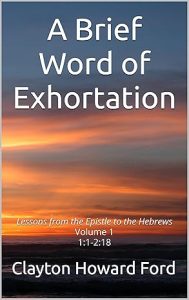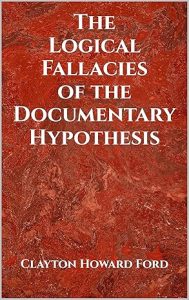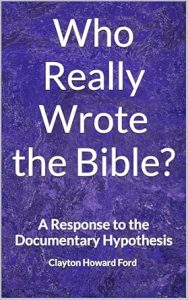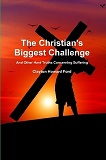So which doctrine is correct?
The two doctrines have existed since the first century and the supporters of the doctrines have been arguing with each other also since the first century. And so far, no one has been able to convince the other side. The problem is that both sides have Scriptures to back them up, which suggests that the Scriptures actually teach both.
In fact, there are instances where both doctrines show up in the same Scriptural passage. In Jer. 18:1-10, the Lord tells Jeremiah to go to the potter’s house. There the prophet sees the potter make a vessel, only to squash it and make it into another vessel. The Lord then says that he can do the same to Israel, that he can do whatever he chooses. That’s election. That’s God making his choice. But then, in that same speech, the Lord tells Jeremiah that if he says he is going to destroy a nation but that nation chooses to repent, he will spare that nation. Conversely, if he says he is going to bless a nation but that nation chooses to do evil, he will relent from blessing it. That’s free will.
Acts 13:14-51 tells the story of how Paul and Barnabas came to Antioch in Pisidia to preach the Gospel. They started at the synagogue of the Jews and were asked to return the following Sabbath to preach again. But the Jews became envious of all of the Gentiles who also came to hear, so they contradicted Paul and Barnabas. Paul said to them that he and Barnabas would therefore turn to the Gentiles, “since you reject it” (v. 46). That’s free will. The Gentiles were glad to hear Paul say that, and the Scriptures say, “And as many as had been appointed to eternal life believed” (v. 48). That’s election.
But if the Scriptures really teach that both are true, why do we argue so much over these doctrines? We do so because, logically speaking, we cannot reconcile the two. We cannot understand how we can freely choose to be saved if God has already chosen who would be saved before the foundation of the world. We see the two as logically opposed to each other and therefore cannot reconcile them in our minds.
But the Scriptures are full of mysteries like this one. Trying to reconcile these two is like trying to reconcile how God can be one God, yet three Persons. And it is like trying to reconcile how Jesus can be both God and man at the same time. Yet, the Church stopped arguing over these truths long ago because it simply accepted that reconciling them goes beyond our limited human understanding.
So, too, reconciling election and free will goes beyond our limited human understanding, which is why the Scriptures teach both without once trying to explain how both can be true at the same time. C.S. Lewis acknowledged this decades ago. In Letters to Malcolm: Chiefly on Prayer (p. 49), he refers to Pelagius and Augustine, who debated each other over this very issue in the fifth century. Pelagius supported free will; Augustine supported election. Lewis refers to them in his discussion of “the whole puzzle about grace and free will. You will notice that Scripture just sails over the problem. ‘Work out your salvation in fear and trembling’—pure Pelagianism. But why? ‘For it is God who worketh in you’—pure Augustinianism. It is presumably only our presuppositions that make this appear nonsensical. We profanely assume that divine and human action exclude one another like the actions of two fellow-creatures so that ‘God did this’ and ‘I did this’ cannot both be true of the same act except in the sense that each contributed a share.”
Perhaps an analogy will help us understand what he is saying. Suppose that I have a flat tire, but the nuts are on so tight that I cannot loosen them by myself. So you grab one part of the wrench and I grab another part. We twist it together and the nuts come off. The question then is: who loosened the nuts? You or me? The answer is, we both did.
Who chose to save us? Did God choose to save us before the foundation of the world (election)? Or did we choose to save ourselves (free will)? The answer is Yes. Yes, God chose to save us before the foundation of the world and yes, we freely chose salvation. We and God did this together.
In fact, the Scriptures teach that everything we do, we do together with God. As Jesus said, “Without Me, you can do nothing” (John 15:5). We cannot even choose to be saved without him. Perhaps we do not understand how that works, but God does.
Through the prophet Isaiah, God reminds us that he is in control of everything, including the future:
“Remember this, and show yourselves men;
Recall to mind, O you transgressors,
Remember the former things of old,
For I am God, and there is no other;
I am God, and there is none like Me,
Declaring the end from the beginning,
And from ancient times things that are not yet done,
Saying, ‘My counsel shall stand,
And I will do all My pleasure,’
Calling a bird of prey from the east,
The man who executes My counsel, from a far country.
Indeed I have spoken it;
I will also bring it to pass.
I have purposed it;
I will also do it” (Is.46:8-11).
God sees the end from the beginning, which means that God has a predetermined plan. God is so wise and powerful that he can give all of us free will and still pull it off. His counsel shall stand. As an example, we are told that Ruth just “happened to come to the part of the field belonging to Boaz” (Ruth 2:3). We know, of course, that she did not just “happen” upon Boaz’s field. It was God’s plan for her to get to that field and he fulfilled his plan without violating her free will. God predestined us to be saved, but he did so without violating our free will. God, and only God, knows how to make election and free will work together.
To be continued…








